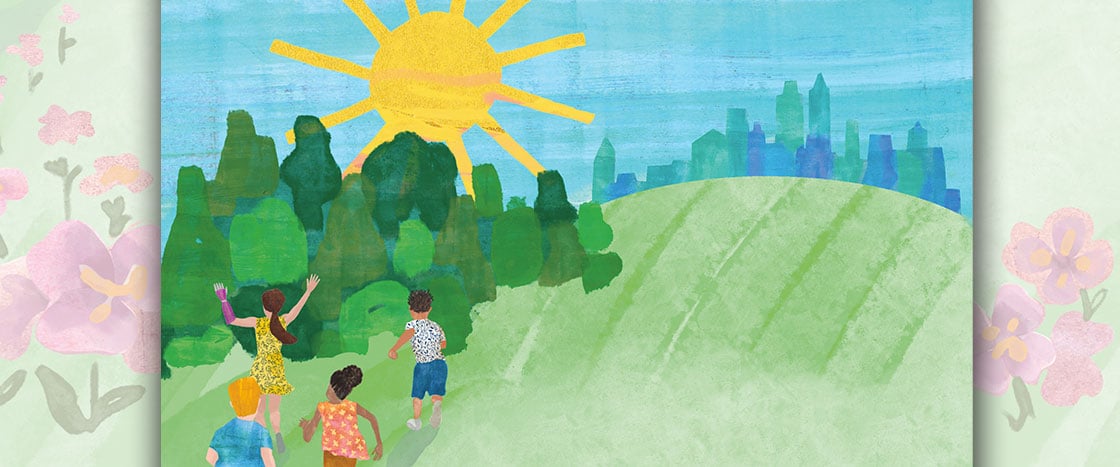Tara Takes On Montclair
Want to hear this poem read aloud by a Storyworks writer? Find the audio read-aloud in your Resources tab.

A girl discovers that “the countryside” isn’t so bad after all
Learning Objective: Students will infer how the speaker in the poem feels about the setting in which she is spending the summer. They will look at how her attitude, and her description of the setting, changes in the poem.
Tara Takes On Montclair
What’s wrong with summer in the city? I
hate thinking of my friends, back on the block, joyous
in games of stickball without me, while I roam
some stupid street in Jersey with strangers I hardly know the
names of, just ’cause my folks want me to see “the countryside.”
Okay, there’s endless green and an ocean of sky. So what? Then I look
at my cousins’ house, swimming in grass—no concrete here.
Wait. They have a yard brushing up against a wall of trees? And the
grown-ups let us kids run wild? Oops!—we stomp Aunt Vy’s violets.
“Let’s head for the woods!” my cousins suggest. No longer shy,
I say yes. (Guess the countryside is something I can abide.)
Why are some words in bold? Read them from top to bottom. The poet borrowed a line from another poem to honor a poet who came before her!
This poem was originally published in the May/June 2022 issue.
1. Preparing to Read
Have a volunteer read aloud the Up Close box.
2. Reading the Poem
Discuss the poem together by answering the questions below.
3. Discussing the Poem
Where does this poem take place? Based on the first stanza, why is Tara, the narrator, there? (key details) The poem takes place in Montclair, New Jersey. Tara is there because her parents wanted her to spend the summer in “the countryside” instead of the city.
How does Tara feel about being there at first? How do you know? (text evidence) Tara is unhappy and resentful about being in Montclair. She imagines her friends having fun back in the city, “joyous in games of stickball without me . . . .” She refers to her current spot as “some stupid street in Jersey with strangers I hardly know the names of . . . .”
What imagery—or words that help you picture something—does Tara use to describe the setting in the second stanza? (setting) She describes “endless green and an ocean of sky.” Her cousins’ house is “swimming in grass” and the yard brushes up against “a wall of trees.”
4. Skill Building
Distribute or assign the Poetry Kit, which will help students dig deeper into the poem and to connect it to other stories in the issue. It is available to print or as an interactive slide deck that students can complete digitally.
5. Collaboration Station
Put students in pairs to practice reading the poem aloud. One partner should read the first stanza, then the other reads the second. They should practice conveying Tara’s feelings and how they change through the expression of their voices. Then have each pair join another pair to recite the poem to each other.
Introduce students to more poems by Nikki Grimes that pay tribute to women poets of the Harlem Renaissance in her collection Legacy: Women Poets of the Harlem Renaissance.
The narrator of this poem, Tara, learns to appreciate the place where she’s spending her summer. Let your students explore more stories about kids, both real and imagined, who learn to adapt to change in our special text set.